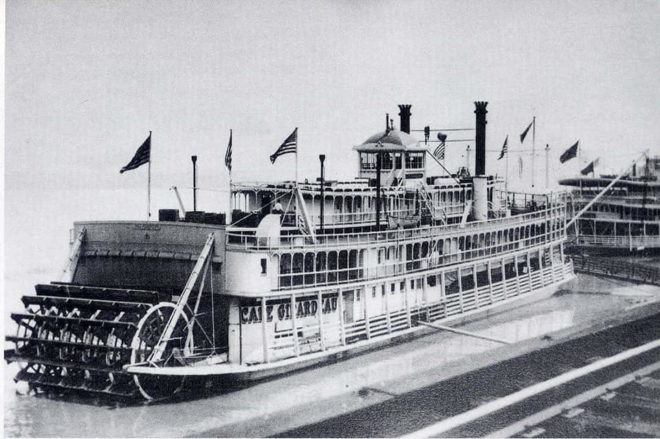The steam packet boat is one of the most enduring and iconic images from the glory days of the Steamboat Era. Designed to carry both freight and passengers, packet boats ranging from palatial Mississippi River sidewheelers to the smaller steamers common on rivers like the Cumberland or the Tennessee played a central role in the development of the inland rivers economy. However, the rise to prominence of the railroad and, later, the automobile in the late 1800s and early 1900s signaled the end of the packet boat’s heyday. Although packet steamers continued to be built during this time, by the 1930s the packet trade had all but dried up.
This big-picture history can be seen in the local story of the Howard Shipyard, with the Howards launching their last packet boat in 1923. The CAPE GIRARDEAU, a sternwheeler measuring 210’ x 38’ x 6.5’, was built for the Eagle Packet Company for use in the Louisville-St. Louis packet trade. She also made annual Mardi Gras cruises down to New Orleans.

With the end of the packet trade in the 1930s, in 1935 CAPE GIRARDEAU was sold to Greene Line Steamers, who re-named her GORDON C. GREENE in honor of the company’s founder. During this time, alterations were done to make her more well-suited to being an overnight excursion boat, including the addition of her unique double Texas deck. It was common for former packet boats to find new life as excursion boats, and for nearly twenty years GORDON C. GREENE carried thousands of passengers and tourists on cruises up and down the inland rivers.

Despite becoming a well-known and well-loved sight on the river, time and wear eventually caught up to her and in 1948 she was replaced as the company’s flagship overnight boat by the DELTA QUEEN. GORDON C. GREENE was fully retired in 1952, when she was sold off to become a floating hotel in Portsmouth, Ohio. Over the next two decades, she was sold and re-sold to serve as various riverside attractions around the country, until on the morning of December 3rd, 1967 she sank at her moorings in St. Louis, where since 1964 she had been in use as the floating restaurant RIVER QUEEN. Today, when the river is very low, parts of her wreck can still be seen on the riverbank near the Eads Bridge.





Sources:
Fishbaugh, Charles Preston. From Paddlewheels to Propellers. Indiana Historical Society: Indianapolis. 1970.
Way Jr, Frederick. Way’s Packet Directory, 1848-1983. Ohio University Press: Athens. 1983.
“Gordon C. Greene”. steamboats.org. https://www.steamboats.org/steamboat-pictures/steamer-gordon-c-greene.html
